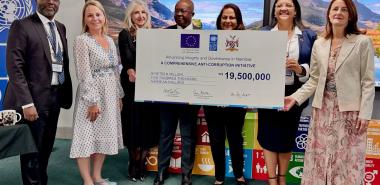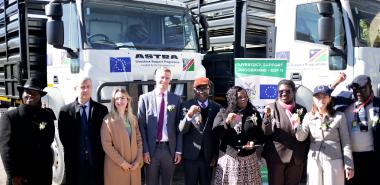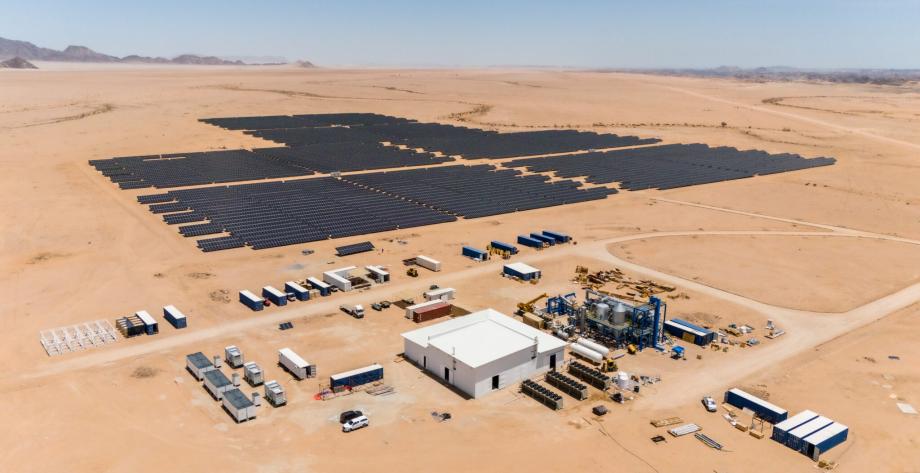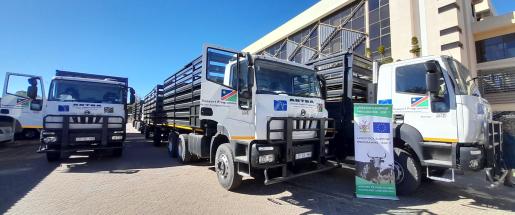EU Projects with Namibia
Global Gateway
Featured projects

HUMAN RIGHTS & DEMOCRACY
Good Governance Programme

INCLUSIVE GROWTH, PRIVATE SECTOR ENGAGEMENT
Livestock Support Programme in the Northern Communal Areas of Namibia

ENVIRONMENT AND CLIMATE CHANGE
Blue Benguela Current – Sustainable Marine Biodiversity Management
Strategic partnership
on Green Hydrogen and Critical Raw Mineral Value Chains
The EU and Team Europe supports Namibia’s green industrialisation, in line with Namibia’s ‘Vision 2030’, the ‘Harambee Prosperity Plan II’ and the EU’s Global Gateway Strategy. Our cooperation builds on Namibia’s strong renewable energy potential, its commitment to a green and digital transition and its strategic location.
The EU-Namibia Strategic Partnership on Sustainable Raw Materials Value Chains and Renewable Hydrogen was launched through a Memorandum of Understanding signed by European Commission President Ursula von der Leyen and the late President Hage Geingob. As the first such agreement with an African country, it aims to develop integrated, resilient value chains for green hydrogen and critical raw materials—supporting a just and inclusive green transition.
A joint implementation roadmap (2023–2025) was endorsed at the Global Gateway Forum in October 2023. The partnership is delivered through the Team Europe Initiative on Inclusive Green Growth, bringing together the EU, Member States, the European Investment Bank, and development finance institutions. Together, they are expected to mobilise approximately N$20 billion (€1 billion) in support. Together, we are forging a sustainable future—powered by green energy, driven by innovation, and grounded in partnership.
Green hydrogen
The EU supports Namibia’s ambition to become a global hub for renewable hydrogen. Our efforts focus on:
- Assisting the Green Hydrogen Implementation Authority to establish regulatory frameworks and conduct socio-economic and technical studies
- Enhancing urban development around Lüderitz, Aus and Walvis Bay for green hydrogen production
- Developing infrastructure for the secure transport and production of green energy and hydrogen
- Supporting green hydrogen pilot projects, including in Walvis Bay and Daures.
- Promoting skills development for green hydrogen training and education
- Strengthening the capacity of civil society to contribute to the governance and management of the green hydrogen sector
These efforts promote local value addition, technology transfer, and inclusive development within Namibia’s green hydrogen sector.
Renewable energy
-
The EU partners with Namibia to reducing its reliance on imported electricity and increasing energy access for Namibians. The EU supports initiatives aligned with Namibia’s 2030 targets to add 100 MW of renewable energy and achieve 91% decarbonisation. Key initiatives include:
- Supporting renewable energy generation and its grid integration to ensure access to electricity for Namibians
- Strengthening capacity for the green transition through technical and vocational education and training
- Promoting the Green People’s Energy initiative, enhancing rural and peri-urban electrification and solar energy projects
- Facilitating investment in renewable energy projects, such as a 40 MW Biomass Power Plant, battery energy storage systems, and a renewable energy credit line
By strengthening local capacity and infrastructure, the EU contributes to a more inclusive and sustainable energy future for Namibia.
Critical raw materials
The EU works with Namibia to promote responsible and transparent development of critical raw materials, focusing on:
- Promoting transparency in the mining and minerals sector, including support for Namibia's potential participation in the Extractive Industries Transparency Initiative (EITI)
- Identifying and facilitating sustainable raw material value chain investments through the Africa Maval project, EU-Namibia business fora and other efforts
- Building capacity for geological exploration, through support to the Geological Survey of Namibia and projects and studies on geological mapping
Together, we are building sustainable value chains that benefit both Namibia and Europe, grounded in transparency and long-term partnership.

Thanks to its abundant renewable energy potential, Namibia is becoming a front-runner in the green hydrogen space. The EU is proud to be a partner in this transformative journey towards green industrialisation. Together we can further decarbonise our economies, create jobs and ensure a more prosperous and greener future for our societies.

Environment
biodiversity, agriculture and blue economy
The EU is working with Namibia on environmental conservation and climate change mitigation in Namibia. We aim to protect natural resources, enhance biodiversity, and support a sustainable blue economy. Focus areas include:
- Supporting ocean conservation through the Integrated Conservation and Sustainable Use of the Benguela Current Large Marine Ecosystem (BCLME) project
- Promoting transborder water basin management in Southern Africa
- Mitigating climate change by supporting Namibia’s Nationally Determined Contributions (NDC) through the GCCA+ initiative
- Conserving biodiversity by supporting key transfrontier conservation areas across Southern Africa through NaturAfrica
- Improving livelihoods through the Livestock Support Programme
Together, these initiatives promote environmental stewardship and sustainable livelihoods—advancing shared climate and conservation goals.

Water
Improving access to clean water and strengthening sustainable water management are key to EU support in Namibia. Activities include:
- Supporting the Water Sector through a programme for improved water supply, including loans and grants for key projects
- Securing Windhoek’s water supply by funding wastewater treatment plants, potable water reclamation, and water loss reduction initiatives
- Conducting a feasibility study for a masterplan to ensure sustainable water supply to Namibia's central northern area
- Supporting integrated water resource management in the Cubango-Okavango River Basin through a regional transborder water management programme
Through these initiatives, the EU supports long-term water security and sustainable development across Namibia.

Transport
The EU and Namibia are working together to strengthen transport infrastructure and governance, with a focus on strategic trade corridors. Current initiatives include:
- Conducting a scoping study for Corridor No. 9 (Maputo-Gaborone-Walvis Bay) as part of the AfricaRISE project
- Supporting trade and transport facilitation measures for strategic African corridors, with funding allocated to Namibia
- Enhancing road transport governance through targeted support for road transport systems in Namibia
These efforts contribute to more efficient trade flows and regional integration, enhancing Namibia’s role as a logistics hub in Southern Africa.
Education, Culture & Youth
The EU works with Namibia to strengthen education, skills development, and youth engagement—laying the groundwork for a more inclusive and future-ready workforce. Key initiatives include:
- Budget supporting to Early Childhood Development (ECD) and pre-primary education
- Promoting technical and vocational education and training (TVET) in the green transition, alongside support for vocational training centres with solar installations for sustainable energy supply and enhancing agricultural qualifications for TVET providers
- Empowering youth through the Africa-EU Youth Lab and Africa-EU Youth Academy
- Namibia also participates in the Creative Africa Audiovisual initiative, in African-European museum partnerships, and in the Erasmus+ programme
Together, these initiatives empower young Namibians with the knowledge, skills, and opportunities to shape a sustainable future.
Governance & Civil Society
The EU supports Namibia’s efforts to strengthen governance, promote accountability, and foster inclusive civic participation. Focus areas include:
- Supporting the development of a national strategy to combat gender-based violence and promote gender equality
- Enhancing civil society organisations' capacities in promoting evidence-based policy advocacy and participate in policy dialogue
- Building the capacity of Namibia’s Anti-Corruption Commission to combat corruption.
- Enhancing economic governance in Sub-Saharan Africa with capacity-building initiatives
- Promoting green and circular business models as well as capacity development and strengthening of the regulatory and policy frameworks
- Promoting participatory democracy, strengthening civic education and access to human rights
- Increasing port security and targeting illicit financial flows to combat transnational organised crime and terrorism
These efforts reinforce a democratic and rules-based environment that supports Namibia’s sustainable development goals. (Complementary to Global Gateway initiatives)

